- Home
- Ralph Peters
Shadows of Glory Page 5
Shadows of Glory Read online
Page 5
The man had degenerated into shameless mirth.
“Got your luggage and all?” he asked as I stepped down. He pulled his ear hard, as if to hurt and keep himself from laughing. Yet he could not control himself.
“My bag was forwarded from the station, thank you.”
He held out a big, red hand.
I could not but take it. If he was estranged from true religion, he had been brave and willing.
“Abel,” he said, fair engulfing my hand, “I’m not sure whether trouble brought you to Yates County, or if you just brought more trouble to Yates. But I didn’t like the looks of that nonsense back on the High Road.”
“Indeed.”
“Well, we’ll get to the bottom of it.” He seemed to mean it well. But even then he could not strap in his laughter. He let go of my hand and said, “You be sure to tell me how you like Rev’ Morris’s hospitality. And I’ll make sure the Benham House has a room for you, if you need one. Don’t you worry.”
“A man of the cloth may live humbly, yet nobly,” I assured him. “I will be content.”
He grinned. His mustache spread, dripping beads of water and ice. “Well, we’ll just see. ’Night now.” He clicked his tongue at the horses to spare the whip and they stepped on.
A path had been cleared through the snow and I followed it up to the porch. The parsonage looked prim, but not falsely modest. Your Methodist works hard, and the results are to be seen in such provision.
A bell hung by the door. I rang it. Longing for warmth.
A conversation broke and footsteps come toward me. The door swung open and a clerical man stood before me where the light bordered the darkness. Lean and gray he was, with his hair combed up to a point and fixed with macassar.
“The Reverend Mr. Morris?” I asked.
He smiled as if in ecstasy. “The same, the same! And you’re Brother Jones? Major Jones? You’re Abel Jones? Of course you are, of course you are! She said you’d come in time.” He fished a pocket watch from the billows of his waistcoat. “Right on the hour! See that? Right on the hour!”
The Reverend Mr. Morris seemed prone to enthusiasm.
“Come in, Brother Jones, come in!” he cried, clapping me on the shoulder in welcome. “You’re just in time for our seance!”
THREE
NOW, THAT WAS NOT IN THE ORDER OF THINGS.
The fashion for the seance was not unknown to me, you understand. Popular they were back in Pottsville, too. I even knew of one good chapel woman who had thus indulged, longing to contact her lost daughter. Of course, my wife and I never succumbed to such irregularities. We read of such, and heard things, but no more. Deviltry the business was, and worse.
The seance was the stuff of charlatans and impostors, its audience a harvest of old maids, widows, enthusiasts and improvident youth. The hard-learned answers were not good enough for them, and they sat around their rapping tables, summoning spooks. It churned me to ponder such seductions practiced upon the weak of mind and forlorn. I had no doubt that money changed hands.
I dismissed the public’s appetite for spirit contact as nonsense and would not be enticed by the demonstrations advertised. For I had seen the fakirs of the East and knew the clever tricks such fellows play. Our “spiritualists,” all rappings, claps and ghosties, were only shadows to that Hindoo dark. Still, the common mind wants gulling. It is the stuff of magic shows and politics. But seances were not what we expect within a pastor’s home.
I determined to have no part of the wickedness. I would as soon have sat me down to cards. And drink, too.
That is how I felt. I will admit my temper was not of the best, for the strain of the day had left me peevish. When Mr. Morris showed me to my room, to spare me five minutes for my personals, I flared at the prospect of such folly lurking in a man of God’s abode.
I held my tongue, though. For hasty speech brings long regrets.
My room was clean, I will say that. Methodism does not spare the broom. My Mary Myfanwy holds to a useful rule: The hand that ends the scrubbing of a floor before the last verse of a hymn is sung—and a hymn of Charles Wesley’s, mind you—has not performed the duty of a housekeep.
“Hurry, now. Hurry back down, Brother Jones,” the pastor had cried, eyes all aglow. Like our small John’s lit up on Christmas morn, bedazzled by the German tree. “They’re waiting for you. They’re waiting, waiting. She said you’d come! She foretold it! They’re waiting in the parlor.”
My bag stood beside the bed, properly delivered. I put dry stockings on my feet, then sat. I would not be insulting to my host. But seances were infamous, and wrong. Theaters of the devil they were. As if the common theater did not hold sin enough. Resolved to tell the fellow that I had a great need of rest—which was truthful, see—I went back down the stairs. I wanted supper, but would forego it if I might thereby avoid the spirit nonsense.
Oh, Sheriff Underwood’s warnings had a different ring now that I knew the doings that went on. I wondered if the Benham House had rooms that might not be as pricey as the rest, perhaps the sort tucked up beneath the eaves. With longing, I recalled my handsome stew.
Well, down I creaked, glad anyway of shelter for this night. For I was too worn and weary to depart again. Tomorrow would do. My hands and face remained cold as the tomb, my limbs were slow, and I felt light of head.
The Reverend Mr. Morris stood waiting for me in the downstairs hall. Even the way his hair stuck up in a point annoyed me now. It seemed too gay and greased for his position, although his dress was dark and proper.
“Here he is!” he cried. “He’s ready, he’s ready! Here’s Brother Jones!”
I heard a rush of whispers from the parlor.
The pastor seized my arm, as if to parade me down an aisle. I do not like such intimacy right off, but want a space around me until I know a fellow. Besides, I have my awkwardness of leg, and it is hard to keep step with another. I had to switch my cane to my left hand.
I had prepared a little speech that would allow me to retire politely—for rudeness is but a fist with no courage behind it. The words were on my lips as we went in.
Into that room that trapped me, heart and soul.
A red shawl wrapped the glass of the single lamp. The only other light come from the corner stove, its fire seething low behind the grate. The air felt as heavy as the parlor furniture. Hardly more than shadows, the other guests were seated at a table. Round it was, and large enough for six.
A vacant chair awaited me.
I saw too much too swiftly, despite the gloom, and must put it in order for you. As my eyes learned their way, I got a pair of shocks. Twas as if a boxing fellow had his one-two way with me.
Let me begin with the lesser astonishment.
Right there, between a pair of ladies in their prime, sat a great Negro fellow. Now do not misunderstand me. I have naught against the Negro. I wish him free and unsuffering, and hope he will again enjoy the pleasures of his African homeland. Nor do I think him less than other men in right, or soul, or even virtue. But surely you will understand my wonder that such a fellow, however finely dressed, had found a seat between two proper ladies.
And they were all holding hands!
Well, this was abolitionism sure.
That was the lesser matter. I saw it in a moment, for my eyes had no more time. Neither did I dwell upon the other man who sat there, although I recognized the horseman from the road. The one the sheriff called “the Great Kildare.” His icy look meant nothing at the moment, for I had seen a sight that stopped my heart.
Twas the girl from the churchyard. The beauty whose beauty seemed wrong. She sat there in emerald velvet, red hair hanging free in waves of fire. The shadows adorned her, and her ivory complexion shone in the lamplight. Queer it was. Her features made no sense. All juts and angles, still they summed to beauty. But, above all, it was her eyes that called me. Brooding on such women, the Irish speak of spells, “come-hithers,” put on boys and men.
Now, do not hear
me wrongly. I do not hint at improprieties of deed or thought. For I was contented in my personal matters, and the blunders of my youth lay far behind me.
But she drew me! Those eyes burned. With the slow, deep fire of peat smoldering. There was no haste or drama in the girl. Or would you have me say “the woman”? For she seemed half of each. She gave no hint of pretense or imposture, but sat sedately. She might have been waiting for a coach.
And yet she ruled that room.
My mouth must have hung open like a boy’s. I stood suspended. The tyrant Time had lost his grip.
She glanced up at me—only for a moment—and the spell abated. Perhaps she had decided to loosen her hold and let me go.
The party rose to its feet, as at a signal. One lank and bespectacled, the other merrily plump, the ladies fluffed their skirts free of their chairs. A great starched rustling they made as they fled the Negro’s grip and ran to me. For his part, the black fellow straightened himself with a wonderful gravity of demeanor. Noble he seemed, all tall and grand. The bearded horseman kept himself apart.
But I must say a few words more about the Negro. Hued though he was, the good darkie had a polish lacked by many a paler man. He wore a wealth of hair, touched with gray and shaped like Pharaoh’s in a lithograph. His dress was matchless neat and somber. Intelligence sat on him, as though he were no African at all, but dark-skinned by some accident of birth. Stern of visage, his eyes mixed wariness with boundless sorrow. Now you will think me odd, but I will tell you: I looked at him and thought, “There is a man!”
For her part, the red-haired girl sat in peace. As if the world were no concern of hers.
Excepting the horseman and the girl, the pastor’s guests seemed easy and familiar. You sensed their acquaintance had been a long one. Without the least breath of impropriety, I will say there was great warmth between them all.
“May I present,” Mr. Morris began, “my dear, esteemed friends . . . esteemed friends . . . Mrs. Stanton and Miss Anthony?”
And didn’t those two thrust out their hands like they were men? Startled, I could but shake their mild appendages, though with a little bow to soften the presumption.
Mrs. Stanton was the one that did things first. Round and vivacious, she rushed at you. She grasped my hand as if it were the handle of a pump and gave it a hearty up and down.
“An honor, sir,” she said, “to shake the hand of a champion of our noble Union. But you have suffered wounds?” She glanced down at my leg.
“A minor matter, mum,” I said, embarrassed.
“Oh, Susan,” she said to her friend, “I do admire men in their regimentals! Would that we could fight beside them!” Before I could withdraw, she grasped one of my buttons to inspect it more closely.
“Lizzie!”
“Oh, don’t be a buzzard, Susan. This is the uniform of emancipation, and it is only proper that we admire it. Isn’t that right, Mr. Douglass?”
Miss Anthony, the stricter of the two, offered a crisp, official sort of handshake. She looked right into you, that one, though one eye seemed awry behind her spectacles. Deep waters there, I thought.
“And surely you have heard,” Mr. Morris said, pulling me free and facing me toward the Negro fellow, “surely you’ve heard of that great philosopher of freedom . . . philosopher and publisher . . . the journalist and orator . . . the great orator, Mr. Frederick Douglass?”
I could not say I had. I murmured, as we do in such circumstances.
The African stood a giant in compare to me—although size is not all that makes a man. Regal he was, though—and I am measuring my words. Laugh if you will, but had you been beside me, you would have thought him more the president than dear Mr. Lincoln. Dignity attended each of the fellow’s gestures, and he took my hand with a solemnity nearly morbid. I know not if the Africans had kings, but if they did he come of such descent.
“I am honored, Major,” he said, voice deep as the wisdom of Solomon. “Honored. We stand informed of your heroic deeds on the field of Bull Run.” Up close, his eyes seemed lonely as the grave, and twice as deep. “You are welcome among us, sir. Ah, could we but accord a hero’s due . . .”
I turned in alarm to Mr. Morris, who read the question on my lips.
“Oh,” he told me, “no need to hide your light under a bushel, Brother Jones. No need to hide your light. The Reverend Mr. Abernathy took the liberty . . . liberty of writing of your exploits. He wrote of your exploits, sir, upon the field of battle . . .” He looked around at his guests. “Achilles stands among as . . . an Achilles!”
I do not resemble Achilles. Anyway, I have read my Homer and find all those Greeks a bad sort. Give me your Roman Cincinnatus, thank you. But I understood the fellow meant it kindly.
I will not tolerate exaggeration, though, much less error. I was no hero at Bull Run or elsewhere, but only did my duty, and that poorly. It is a wonder how these rumors start.
“You are mistaken, sir. I am no hero.”
“Thus a hero speaks!” cried Mr. Douglass, raising an arm to hail me.
Kildare had crept up on us in the meantime.
“And here, Brother Jones,” Mr. Morris said, “is our guest of honor . . . guest of honor. No. No, that’s you, that’s you.” He reddened. “The ‘captain of our endeavor,’ let us say. Yes, the captain! Of our endeavor, our exploration!” He beamed respect upon the swarthy fellow. “The learned Professor Kildare, Master of Spiritualism, Mesmerism and Egyptology . . . of Egyptology, sir! Think of it, think of it! And Doctor of Ancient Languages, as well! Of languages! Oh, how I wish I had a little Greek!”
The Great Kildare bowed with a tight smile. “At your service, sir.”
“And yours, sir,” I said. Although I fear I did not mean the words. I am no friend to strangeness and was not at his service. Nor did I wish the man at mine. Yet social life demands these small dissemblings. We have fallen far from Eden.
Kildare stepped aside. As if parting a curtain. To reveal that pale vision of a girl.
“My daughter and apprentice,” he said, “a vessel of the high arts of the ancients, of secrets lost for countless millennia—until recovered by myself from Arabia’s sands.” He flourished his hand like a common tout. “I give you . . . Miss Nellie Kildare.”
The girl looked up. Her stare made me feel uncovered. I mean that in no vulgar sense, see. But twas as if she saw more than we are meant to.
I should have turned around and run away.
“Miss Kildare,” I said, with a graver bow.
The girl made no reply. She sat divorced from her surroundings.
“Sit down, sit down,” the Reverend Mr. Morris said. “How late it’s become, how late! Everybody, please. Sit, sit!”
I meant to plead weariness. The Good Lord knows it is the truth. And yet I let them lead me to that table.
“Mr. Morris,” I began, struggling with myself, “I really cannot . . .”
“Don’t be shy! Don’t be hesitant!” Of a sudden, he stopped and gave me an asking look. “Surely . . . surely, this is not a new experience, Brother Jones?”
“I dare not . . .”
“But here’s your place! Just here. The place of honor. Of honor, Brother Jones!”
That vacant chair sat waiting by the girl.
I fought my fate, if weakly.
“Look you,” I told them all, “I’m lately risen from a sickbed.” Twas more than I had intended to reveal. “And there is tiredness in me . . .”
The pastor looked ruptured. “But Brother Jones? Brother Jones! We’ve been waiting . . . waiting. We cannot proceed without six. It must be six!”
Now I have been a keeper of accounts, and have sufficient skill to count to six. And they had six without me. Mr. Morris himself there was, and the two ladies. With that regal son of Nubia attending. Then Kildare and his daughter. Six. And no mistake.
“But I’m the seventh,” I protested.
Mr. Morris wrapped his arm around me, as if I might flee. Twas a boney business, that ar
m, and made me think of meals too closely parsed.
“Not at all! Not at all! Professor Kildare cannot participate in the circle. Cannot participate. It’s the rule, the rule!” He gripped me in his skeletal embrace, all staleness and pomade. “We need you, Brother Jones, or all is wasted, all wasted!”
Lord forgive me, I sat down with them.
The girl. I smelled her. She wore lavender.
And then she closed her fine hand over mine. Mrs. Stanton took me by the other. But that second grip was bare of sensation to me.
“I want her to ask the spirits when we’ll get the vote,” Miss Anthony said.
So transposed was I that her words did not register. Until later. But let that bide.
The Great Kildare dropped himself into a chair by the stove. As if to leave the rest of us to our sport. Mr. Morris opened with a prayer, and nothing queer in it. Then each person nominated a spirit they desired to contact. Mr. Morris named Swedenborg, then Miss Anthony said, “George Washington.” Mr. Douglass hoped to reach his mother, though he seemed somehow reluctant, and Mrs. Stanton asked for a visitation by Queen Elizabeth. Though goaded, I named none.
“Let the spirits find me,” I said in jest.
Nellie closed her eyes—forgive me if I call her “Nellie” now. I think of her that way, see. Smooth as cat or snake, Kildare rose up again and come to her from the shadows. He took a stance behind her chair, so close I could smell the horse sweat on his trousers.
Her father waved his hands over her face and hair, then down over her shoulders. Modestly, of course. He repeated the motion again and again, each time bringing his palms and fingers closer to her, until it seemed certain he must touch her. His hands glided with unearthly smoothness, disturbing not a lock of hair or fold of fabric. The ritual went on long enough to make me drowsy.
The field of action of Kildare’s hands narrowed until his fingertips circled just before her eyes. Smooth and constant as a gentle sea. Rocking like the waves. Watching brought back my lightheadedness. I had to force myself to look away. And even then the rhythms followed me. Kildare seemed to have taken possession of the room. I closed my eyes—I know not for how long.

 Darkness at Chancellorsville
Darkness at Chancellorsville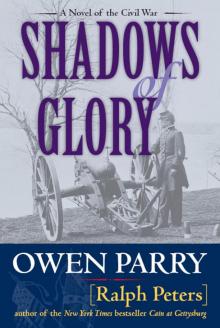 Shadows of Glory
Shadows of Glory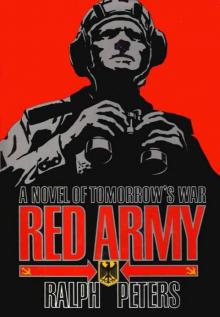 Red Army
Red Army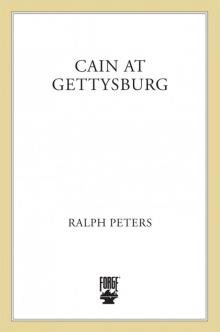 Cain at Gettysburg
Cain at Gettysburg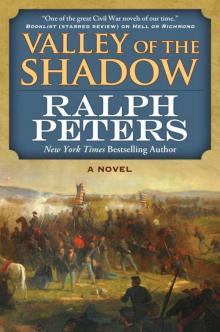 Valley of the Shadow: A Novel
Valley of the Shadow: A Novel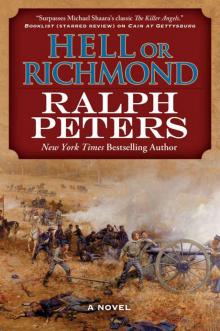 Hell or Richmond
Hell or Richmond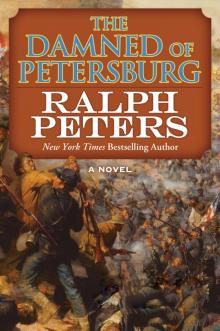 The Damned of Petersburg
The Damned of Petersburg The War After Armageddon
The War After Armageddon The War in 2020
The War in 2020